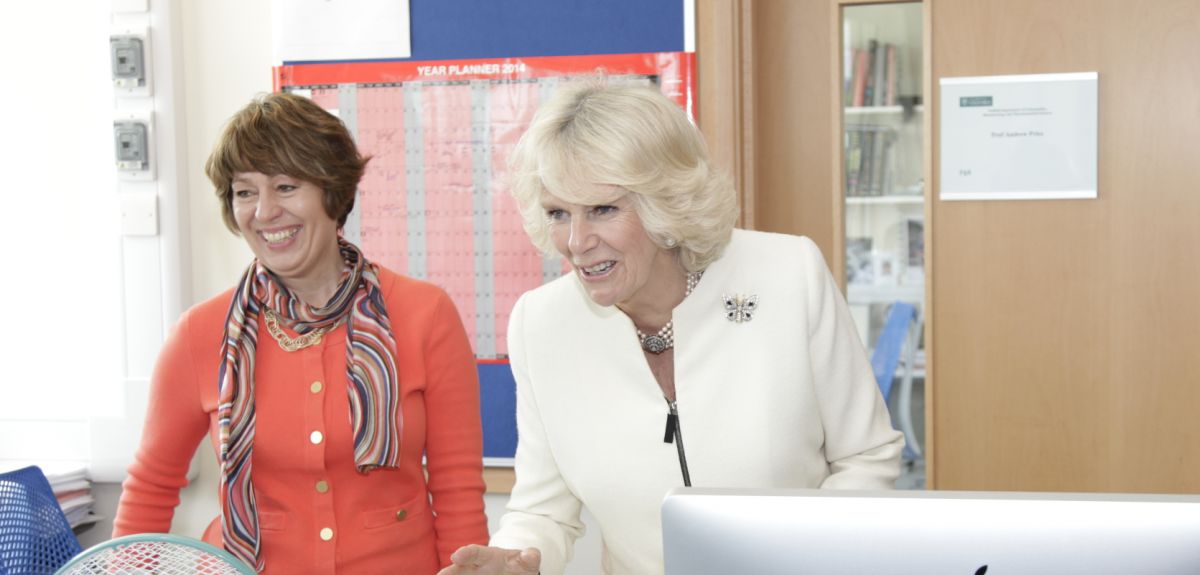
Duchess of Cornwall opens new building at the Botnar Research Centre
A new £12m building at the University of Oxford's Botnar Research Centre has been opened by the Duchess of Cornwall.
The Botnar Research Centre, on the site of the Nuffield Orthopaedic Centre in Headington, carries out research into improving the treatment of arthritis, osteoporosis and other bone and joint diseases.
The Duchess of Cornwall is patron of the Nuffield Orthopaedic Centre (NOC) Charity, which raised the money for the new building.
Her Royal Highness toured the new facility, viewed an exhibition of the work of the NOC Charity and saw examples of the centre's research.
She was shown a simulator for surgical skills training by Professor Jonathan Rees, associate professor of orthopaedic surgery at Oxford University, and assisted him in operating on a model shoulder and knee.
Her Royal Highness said: 'You need a steady hand, you don’t need the shakes…No wonder people have to train so long to do these things.'
Professor Rees said afterwards: 'It was great to have her assist me with a shoulder operation. She was great, a natural. I explained that, through some research carried out at the Botnar Research Centre, we know if we train our surgeons on simulators first it improves their performance in an operating theatre with patients.'
Other examples of the centre's work on display included research on the benefits of vitamin D supplements in pregnancy to improve bone strength in children for later life; bisphosphonate drugs for osteoporosis; the development of an entirely new class of drugs for rheumatoid arthritis; and an innovative new surgical 'biopatch' to promote rapid regrowth of damaged tendon tissue.
The Vice-Chancellor of Oxford University, Professor Andrew Hamilton, said: 'We are delighted that the Duchess of Cornwall is opening the new building at the Botnar Research Centre and welcome her here to see how the centre’s research has the potential to improve treatment for patients here in Oxfordshire and around the world.'
Lord Tebbit, President, of the Nuffield Orthopaedic Centre Charity said: 'The Duchess's interest in osteoporosis is well known and her support will be invaluable for all the clinical and research developments taking place at this time.'
The new building marks the second phase of the Botnar Research Centre, part of the Nuffield Department of Orthopaedics, Rheumatology and Musculoskeletal Sciences, and essentially doubles the size of the facility. Her Royal Highness also opened the original building for the centre in 2003. The two buildings together house over 200 University researchers.
The Botnar Research Centre works in close partnership with the Nuffield Orthopaedic Centre, part of Oxford University Hospitals NHS Trust, ensuring its research is closely tied to patient care in the hospital.
Professor Andrew Carr, director of the Botnar Research Centre, said: 'We were delighted that the Duchess of Cornwall was able to come and visit here again. Conditions such as arthritis and osteoporosis affect the quality of life of many people, particularly in an ageing population. There is a great need for improved treatments to tackle the large burden of disease, pain and disability and make a real difference to people's lives.'
Professor Carr, who is also a consultant surgeon at the Nuffield Orthopaedic Centre, added: 'The Botnar Research Centre brings the University's bone, joint and arthritis research together in a purpose-built facility on the site of the Nuffield Orthopaedic Centre. This allows truly multidisciplinary science right where patients are, offering a partnership between University research and teaching and the work that goes on in NHS clinical practice at the hospital, with many patients participating in research projects and clinical studies.'
At a reception for guests, sponsors, donors and researchers at the end of the visit, the Duchess of Cornwall said of the work at the research centre: 'I congratulate you all. It is really the very best. I think it's brilliant what is being done.'
 New study finds that ChatGPT amplifies global inequalities
New study finds that ChatGPT amplifies global inequalities
 Expert Comment: Chatbot-driven sexual abuse? The Grok case is just the tip of the iceberg
Expert Comment: Chatbot-driven sexual abuse? The Grok case is just the tip of the iceberg
 New surgical 'smart patch' for shoulder injury to be tested
New surgical 'smart patch' for shoulder injury to be tested